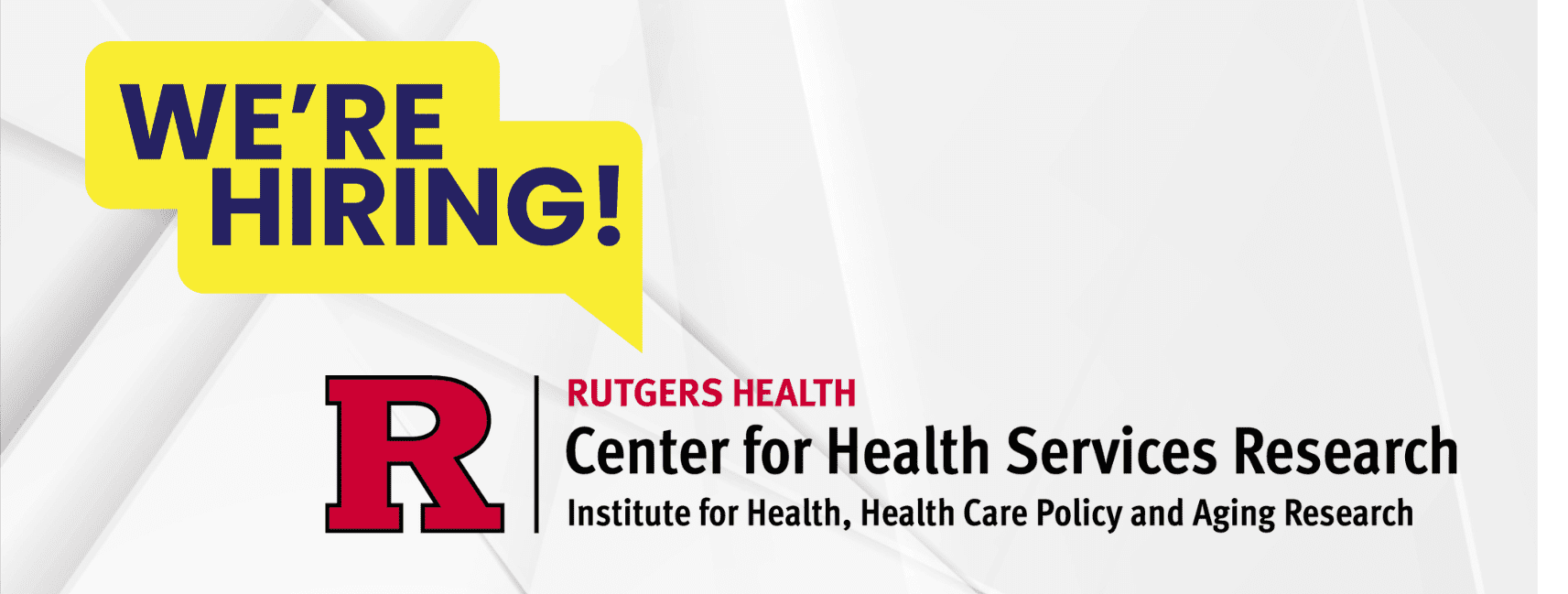

A note from Stephen Crystal, PhD, Director, Rutgers Center for Health Services Research and Distinguished Research Professor, Rutgers School of Social Work on August 28, 2024
Dear Colleagues,
With the start of the semester approaching, we wanted to share with you some exciting opportunities available for graduate research assistants at the Center for Health Services Research, and seek your help in identifying outstanding students who may be interested. These opportunities may be particularly interesting for students interested in behavioral health services research or health policy analysis, and provide opportunities to develop research skills, participate in published research, and potentially to lead to possibilities for dissertation research. Opportunities are available both for qualitative and quantitatively oriented doctoral or other advanced graduate students, and at varying levels of time commitment. They offer opportunities to work with exceptional CHSR faculty doing research on important health services topics of high public health importance. Brief summaries for several of these new projects are below.
Due to the funding of new projects, CHSR also has opportunities for full-time researcher roles, including a currently posted Senior Research Specialist position (see attached); we are also planning an upcoming recruitment for an Assistant Research Professor. These positions may be of interest to recent or upcoming graduates of your programs. We welcome any leads you may have for identifying talented potential research team members.
Those interested in these positions are welcome to contact Natalia Herman, nherman@ifh.rutgers.edu.
Thank you for any help you can provide in identifying promising prospects to join the exciting new research projects underway at CHSR!
Posting Senior Research Specialist–Rutgers Center for Health Services Research.pdf
Graduate Research Assistant posting–NIDA PR RA description_letterhead (002).pdf
Graduate Research Assistant Opportunities:
Project 1: NIDA R-01– Improving Outcomes and Equity for Released Prisoners with OUD: Trajectories of Participation in Pre-Release and Post-Release MOUD, Peer Navigation, and Outcomes
Pre-release medication for opioid use disorder (MOUD) and peer navigation (PN) represent promising strategies for improving re-entry outcomes, but there is great need for better understanding of implementation, utilization, and outcomes of these interventions. Large-scale implementation of these programs across NJ’s 11 state prisons, together with established state/university partnerships and innovative linkage across clinical and administrative datasets, creates a unique research opportunity to develop and disseminate knowledge on these interventions over time that can inform translation and adaptation of these interventions across states. Among releasees with SUDs, the study will: 1.) examine patterns/predictors of pre-release and post-release MOUD and PN; 2.) examine recovery outcomes over the re-entry period and their relationship to peer navigation and MOUD, separately and jointly, utilizing innovative event history analysis strategies incorporating propensity scoring and machine learning strategies; and 3.) analyze, document, and disseminate experiences of implementation and adaptation of PN and MOUD from the perspectives of multiple stakeholders.
Project 2: Clinical and Translational Research Center Pilot Project.
Translating Evidence on Opioid Overdose Prevention into Practice: Applying Translational Science to Strategies and Outcomes for Opioid Use Disorder (OUD) Treatment Engagement Among Overdose Survivors
Specific Aims.
Aim 1. A.) Develop measures to assess uptake of evidence-based clinical interventions for patients at risk of over- dose across settings, leveraging multiple administrative and clinical data sources, including Medicaid claims and hos- pital system-wide electronic health records (EHR). B.) Utilize these measures to assess organizational performance in engagement in treatment for OUD following opioid overdose across 13 hospitals in the Robert Wood Johnson Barnabas Health System.
Aim 2. Identify practices and implementation strategies used by high-performing hospitals through in-depth case studies; identify mechanisms through which these facilities achieved change.
Aim 3. Collaborate with the hospital system to disseminate specific strategies used by high performing sites and support dissemination with feedback of OUD-specific performance measures.
Project 3. AHRQ Learning Health Systems Pilot.
Translating Evidence on Opioid Overdose Prevention into Practice: Implementation and Outcomes of Emergency Department Interventions for Patients Treated for Overdose
Beginning in 2023, the Rutgers Robert Wood Johnson Barnabas Health ED’s established buprenorphine receipt by naloxone-reversed patients as one of its three emergency department quality metrics. Beginning in September 2024, the system will roll out a physician-led education campaign covering the neurobiology of OUD, treatment options including buprenorphine initiation, and expected patient outcomes. In partnership with RWJBH health system collaborators at the Institute for Peer Recovery (IFPR), Rutgers researchers at IFH aim to: